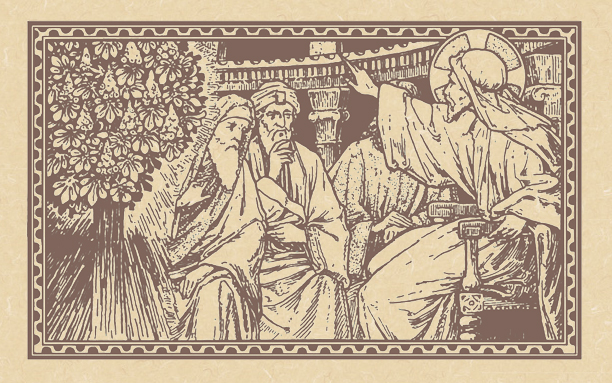Don't Put the Cart Before the Horse.
The Memorial of Saint John Bosco, Priest.*
Lessons from the secondary feria, according to the ordinary form of the Roman Rite:
• II Samuel 24: 2, 9-17.
• Psalm 32: 1-2, 5-7.
• Mark 6: 1-6.
|
…or, from the proper:
• Philippians 4: 4-9.
• Psalm 103: 1-4, 8-9, 13-14, 17-18.
• Matthew 18: 1-5.
…or, any lessons from the common of Pastors for One Pastor, or the common of Holy Men & Women for Educators.
|
The Third Class Feast of Saint John Bosco, Confessor.
Lessons from the proper, according to the extraordinary form of the Roman Rite:
• Phillipians 4: 4-9.
• [Gradual] Psalm 36: 3-6.
• [Tract] Psalm 60: 4-6.**
• Matthew 18: 1-5.
FatherVenditti.com
|
 7:38 AM 1/31/2018 — Today's Gospel lesson is Saint Mark's abbreviated version of what took Saint Luke two Sundays to tell us last year at this time: our Blessed Lord's visit to His home town synagogue in Nazareth. When I posted that homily on my web site I included a photo of the inside of that very synagogue, which is not only preserved, but which is now a church called the Synagogue Church, and which is now the possession of the Greek Catholic mission in Jerusalem. 7:38 AM 1/31/2018 — Today's Gospel lesson is Saint Mark's abbreviated version of what took Saint Luke two Sundays to tell us last year at this time: our Blessed Lord's visit to His home town synagogue in Nazareth. When I posted that homily on my web site I included a photo of the inside of that very synagogue, which is not only preserved, but which is now a church called the Synagogue Church, and which is now the possession of the Greek Catholic mission in Jerusalem.
Mark doesn't tell us the subject of our Lord's homily in Nazareth the way Luke did; in fact, Mark chooses instead to focus on what was only a passing reference in Luke's account: the questions raised about our Lord's origins, probably arising from the jealousy of the professional rabbis who were in attendance that day to hear our Lord preach. Mark doesn't say anything about them wanting to throw our Lord over a cliff like Luke did; instead, he mentions something much more curious. I like Monsignor Knox's translation of the line best: “It is only in his own country, in his own home, and among his own kindred, that a prophet goes unhonoured” (6: 4 Knox). It sounds all the world like he's quoting something, but no reference is given, and it's not familiar. If our Lord is quoting something He's read, it's not the Scriptures; more likely it's just a saying. The curious part is what the Evangelist tells us right after this: “So he was not able to perform any mighty deed there, apart from curing a few sick people by laying his hands on them” (v. 5 NABRE).
Scripture scholars debate at great length whether the “mighty deeds” being referenced are miracles—the Greek word Mark uses is δύναμιν, which means exactly as it's given here: “mighty deed”—but, since we know our Lord has already performed some at this point, they probably are. What's interesting is Mark's suggestion that He's not able to perform any because they won't honor Him. It's a point I had made several times last summer when I was privileged to speak on the 13th when speaking about the Miracle of the Sun: our Lord's miracles—with the exception of the raising of Lazarus—are not meant to prove to anyone who He is or bring people to faith, but rather are rewards for having made an act of faith. They didn't make one in Nazareth, so He didn't do any … except for one: He cured their sick.
It's totally unclear why He makes this exception. Probably it's because the sick are that way through no fault of their own, which, you'll recall, is consistent with our Lord's challenge to the Semitic notion that illness is the result of sin. And, as you know, throughout all the Scriptures illness is an analogy for sin. It's the reason that the sacrament of confession is the only sacrament you don't have to be in the State of Grace to receive.
What I would like you to reflect upon today is the fact that our Blessed Lord did no miracles for his adopted home town because of their lack of faith in Him, which is important to remember during those times when we find ourselves in the midst of some sort of dark night. The act of faith and hope must come first.

* John Bosco (1815-1888) founded the Salesian Society, named in honor of St. Francis de Sales, and the Daughters of Our Lady, Help of Christians. An enlightened educator and innovator, his lifework was the welfare of young boys and girls; hence, he is called "the Apostle of Youth." He had no formal system or theory of education; his methods centered on persuasion, authentic religiosity and love for young people.
** Being a penitential season, the commencement of the Septuagesima season last Sunday calls for the addition of the Tract. Some missals allow the Tract to replace the Gradual, but the rubrics do not bear that out.
|

